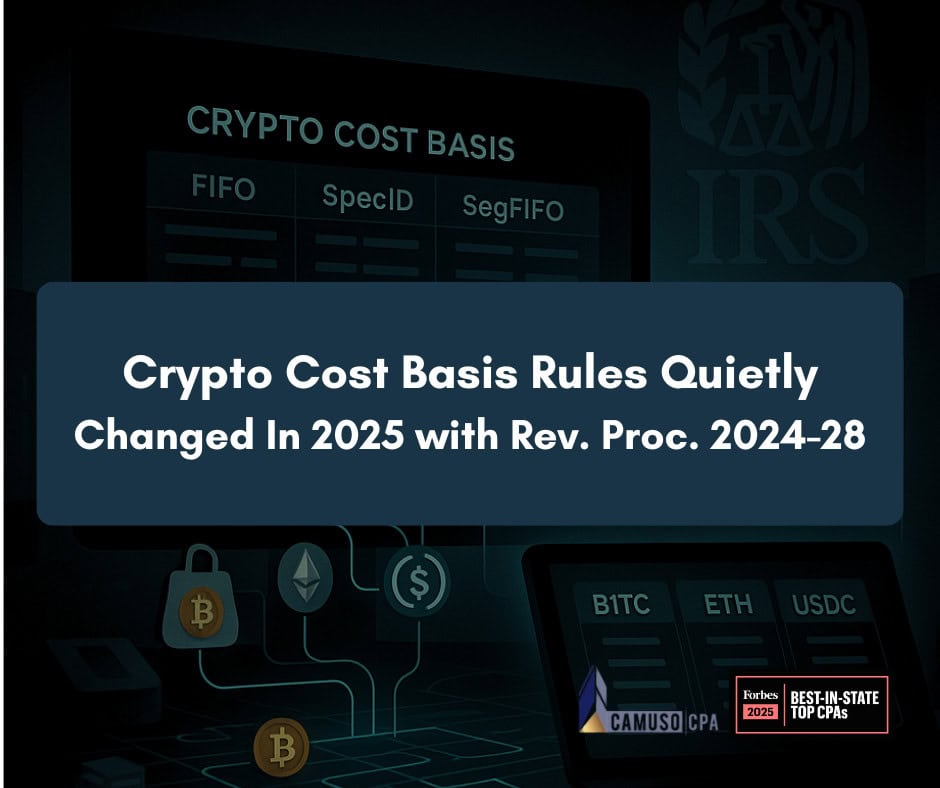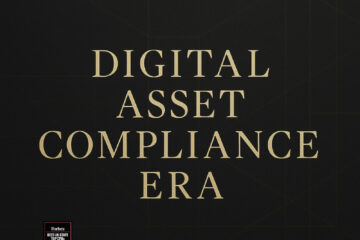Last Updated on October 9, 2025 by Patrick Camuso, CPA
A Paradigm Shift in Crypto Tax Accounting: Why Account-Level Tracking and Pre-Sale Spec ID Are Now Mandatory
The IRS has quietly upended the foundation of digital asset cost basis reporting. Effective January 1, 2025, Revenue Procedure 2024-28 and Notice 2025-7 together establish that digital asset transactions must now follow mandatory account-level tracking and pre-sale lot identification. While many investors and even practitioners remain unaware, the reality is clear, the long-accepted “post-sale Specific Identification” and “universal account pooling” approach is largely invalidated, and failure to comply could result in unexpected tax exposure, failed audits, and a cascade of retroactive compliance issues.
This article outlines the full scope of these changes, their legal foundations, practical implementation strategies, and debunks common misconceptions circulating online. It also clarifies how noncompliant accounting may lead to significant audit risk, phantom gains, or retroactive FIFO recharacterization.
The End of Pooling: Crypto Is Now Account-Based
Historically, many taxpayers and software platforms used a pooled, global cost basis for crypto treating all wallets and exchange accounts as one. This allowed for post-sale Specific Identification (Spec ID), enabling taxpayers to cherry-pick lots after the fact to reduce gains. But this approach never had strong grounding in the regulations.
Under IRC §1012 and Treas. Reg. §1.1012-1(c)(1), cost basis tracking has always presumed account-based recordkeeping. With Rev. Proc. 2024-28, the IRS reaffirms that each wallet or exchange account must be tracked individually. The implication is massive: every acquisition and disposal must be traced within its original account. No more merging assets from different wallets to optimize outcomes.
To comply, taxpayers must now treat each account whether an exchange, custodial platform, or self-custodied wallet as a distinct “container” with its own FIFO or Spec ID tracking. Pooling is no longer permissible under the safe harbor.
The Regulatory Backbone: Revenue Procedure 2024-28 vs. Notice 2025-7
IRS Notice 2025-7 provides temporary relief and operational guidance to brokers subject to new digital asset reporting obligations under Section 6045. It outlines acceptable forms of specific identification under the new Form 1099-DA framework.
However, the core cost basis regime is governed by Revenue Procedure 2024-28, not the broker-specific Notice. Rev. Proc. 2024-28 applies broadly to any taxpayer disposing of digital assets, and it establishes:
- That wallet-level (account-level) segregation is mandatory.
- That FIFO is the default unless pre-sale standing instructions or explicit identification are made.
- That “adequate identification” must satisfy Treasury Reg. 1.1012-1(c) and (e), interpreted in light of digital asset realities.
The IRS outlines that universal pooling is impermissible. Taxpayers must track and report by wallet or exchange (i.e., account-level). No guidance exempts self-custody wallets from this standard.
Account-Level Tracking Is Mandatory, Including Wallets
IRS guidance now requires wallet-level segregation. Each wallet or custodial account is treated as a discrete repository,akin to a brokerage account under legacy securities law.
This has two implications:
- FIFO must be applied per wallet, unless Spec ID is properly executed.
- Basis tracking tools must maintain segregated ledgers across all wallets and exchanges.
This creates several noncompliance risks including universal pooling, app-based cost aggregation, or cross-wallet Spec ID may all fail IRS scrutiny under audit. Retroactive reallocation is disallowed.
Pre-Sale Specific Identification: Now Required
The old method of post-sale specific identification that included reviewing lots after a transaction and choosing which one to apply is no longer valid.
Under both Rev. Proc. 2024-28 and the historical Treasury Regs:
- Specific identification must be done before or at the time of sale.
- Taxpayers must maintain standing instructions or use transaction metadata that identifies the lot.
Pre-2025 Holdings Must Be Allocated
Any digital assets held before January 1, 2025, must be properly allocated to the wallets or accounts in which they resided. This includes:
- Assigning cost basis to each wallet
- Mapping legacy purchases to their correct wallet or exchange
- Segmenting holdings to reflect actual custody structure
Taxpayers who fail to do this will have no defensible position for applying FIFO or Spec ID on a wallet basis. The IRS will likely impose wallet-level FIFO without regard to actual acquisition history. This is a one-time opportunity to cleanly segment cost basis using historical cost basis data.
Audit Risk and IRS Enforcement Outlook
Under the new regime, the IRS is likely to evaluate basis reporting by:
- Reviewing wallet segregation
- Confirming standing instructions for Spec ID
- Validating timestamps on cost basis identification
Failure to satisfy these standards could result in forced FIFO, disallowance of losses, or gain acceleration.
The IRS has made clear that improper cost basis accounting is a priority enforcement area. The digital asset audit will likely include a review of:
- Cross-wallet basis allocations
- Wallet transfer documentation
- Timing and form of lot identification
- Software-based lot selection algorithms
This isn’t just a paperwork issue. If you’ve been trading actively in 2025, you may have already locked in gains without proper identification. That means the IRS will likely default you to FIFO per wallet/account, even if it dramatically increases your taxable gain. Worse, you may not be aware of this until your return is filed or challenged.
The problem compounds under the new 1099-DA regime. Once brokers begin furnishing these forms to the IRS (expected in 2026 for 2025 activity), there will be complete transparency into your trades. If your reported gains don’t match, or you try to use Spec ID without documentation, you’re at risk for audits, penalties, and additional tax due.
Misinterpretations and Clarifications
Several prominent misinterpretations have circulated, including:
“Notice 2025-7 doesn’t apply to wallets, so Spec ID rules don’t either.”
False. Spec ID rules derive from Rev. Proc. 2024-28 and Treasury Regs, which apply to all taxpayers, regardless of 1099-DA.
“You can use post-sale Spec ID for non-brokered wallets.”
False. Post-sale identification violates the longstanding rules for securities and now for digital assets. Identification must be done pre-sale.
“You can aggregate wallets into a universal pool.”
False. Wallet-level tracking is mandatory. Aggregation violates the procedural requirement of account-based segregation.
“FIFO is only mandatory on exchanges.”
False. FIFO is the default anywhere unless you make pre-sale Spec ID.
Strategic Response: Building an Audit-Defensible Ledger
Crypto investors, funds, and tax professionals must now adapt their infrastructure:
- Use tools that support wallet-level segregation and proper cost basis allocations
- Implement standing instructions for tax-lot realization if using SpecID (LIFO, HIFO, etc.)
- Timestamp Spec ID elections contemporaneously
- Document cross-wallet transfers with supporting metadata
- Allocate pre-2025 assets to correct wallets with defensible audit trails
Advanced strategies like Segregated FIFO (SegFIFO™) allow compliance with the rules while still optimizing tax outcomes. SegFIFO™ is a proprietary method that respects wallet segregation while controlling which lots are used under FIFO assumptions.
If you’re holding digital assets or advising those who do there are three essential steps:
- Reconstruct cost basis and freeze it by account: You must go back and identify every acquisition through 12/31/2024, segregated by wallet and account. This becomes your starting inventory.
- Allocate properly across wallets: Use the safe harbor under Rev. Proc. 2024-28 to assign cost basis into accounts if your prior accounting was pooled. This process must be consistent and documented.
- Implement compliant tracking for 2025 onward: Moving forward, track FIFO or Spec ID within each account, with explicit pre-sale instructions or standing methods for Spec ID. Accounting and audit trails must reflect this.
Advisors must also update planning strategies. Gone are the days when you could backtest gains and retroactively cherry-pick lots. Now, decisions must be made before the transaction. Entity structures, wallet segregation, and standing tax strategies must be designed with these new compliance rules in mind.
At Camuso CPA, this is an opportunity to deliver high-value compliance services while protecting our clients from future audit exposure. The roadmap is clear:
- Diagnostic review: Identify which clients used global pooling or post-sale Spec ID and assess their exposure.
- Allocation procedures: Run Rev. Proc. 2024-28 allocation workflows for all assets acquired before 1/1/2025. Document method, sources, and assumptions.
- System upgrades: Migrate clients to accounting systems that support account-level tracking and pre-sale Spec ID.
- Standing instructions: Where Spec ID is desired, establish written standing instructions (e.g., HIFO within accounts) and implement them pre-trade.
- Ledger design: Ensure that cost basis reports are audit-ready: time-stamped, account-level, and backed by transaction evidence.
Remember, auditors will now evaluate compliance per account, not globally. Ledger quality must match.
Most Investors Are Already Out of Compliance
Crypto cost basis rules have quietly but decisively changed. IRS enforcement is no longer hypothetical. Every wallet, every transaction, and every sale must now adhere to account-level segregation and pre-sale identification.
Investors and preparers who continue to rely on post-sale Spec ID or universal pooling are operating on outdated assumptions and may face aggressive audits. The safest path forward is immediate adoption of audit-defensible methods like wallet-level FIFO or standing instruction-based Spec ID. By acting now, especially to allocate pre-2025 holdings, taxpayers can preserve defensible basis, reduce phantom gains, and avoid a compliance crisis in 2026 and beyond.
This is a foundational shift in crypto tax compliance. What used to be an ambiguous area is now governed by clear IRS procedures. Account-level tracking is required. Post-sale Spec ID is dead. Cost basis allocations must be cleaned up now to avoid disaster later.Investors, founders, and funds must act swiftly. Advisors must update workflows. Software vendors must adapt. The window to catch up is shortand enforcement is coming.
Q&A: Clearing the Confusion On Rev. Proc. 2024-28
Does Notice 2025-7 override Revenue Procedure 2024-28?
No. The Notice gives transitional relief to brokers; the Procedure governs taxpayer-level basis accounting.
Do the rules apply to self-custody wallets?
Yes. All wallets must be tracked individually.
Can I still use Specific Identification?
Yes, but only if you make the identification pre-sale using standing instructions or embedded metadata.
Can I allocate my pre-2025 holdings now?
Yes, but you’re behind. It’s important to get your pre-2025 cost basis up-to-date and do the allocation procedure ASAP.
Will the IRS force FIFO if I make a mistake?
Very likely. FIFO is the default and will be enforced unless Spec ID rules are followed exactly.
About Camuso CPA
Camuso CPA is a Forbes Best-In-State Top CPA and crypto-native accounting firm pioneering frameworks such as SegFIFO™, ChainRecon™, and the Digital Asset Tax Blueprint™. The firm specializes in crypto cleanups, audit defense, and advanced tax planning for high-net-worth investors, Web3 founders, Miners and DAOs. Its philosophy is simple. avoid shortcuts and build audit-defensible strategies that maximize long-term wealth.
Next Steps
- Schedule a private strategy consultation
- Subscribe to the Digital Asset Digest for compliance and enforcement updates
Download our complimentary Crypto Tax Blueprint™, adapted from the Digital Asset Tax Blueprint™ process






